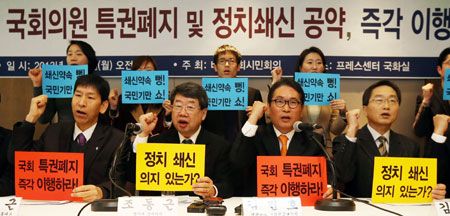
Lawmakers in Korea were given various privileges to fight an authoritarian president and effectively execute people’s demands. But as democracy has matured, those privileges are under public scrutiny.
The National Assembly has come under fire lately for passing the legislators’ pension budget for this year which they previously pledged to abandon as part of voluntary reform plans. Amid mounting public criticism, the ruling Saenuri Party and main opposition Democratic United Party (DUP) last week announced that they will scrap the pension deal during an extraordinary session of the Assembly slated to open this month.
“Most of the privileges that the lawmakers benefit from date back to the previous authoritarian era led by military officials,” said Ka Sang-joon, a political science professor at Dankook University in Gyeonggi Province. “The times have changed so those privileges should be revised as well.”
Lawmakers’ privileges
By law, those who have served as a legislator for more than one day are entitled to receive 1.2 million won (around $1,136) a month after they turn 65.
Experts say this is unfair from a common sense point of view.
“The pension system for representatives was originally implemented to help the livelihood of those who suffered during the pro-democracy movement in the ‘70s and ‘80s,” said Ka. “But a pension is a fixed sum of money you receive based on how much you have paid to the government previously like the national pension. But the current lawmakers are enjoying pension benefits without having to pay anything.”
Lawmakers can also hire up to seven aides and employees using taxpayers’ money.
Critics argue there are too many aides working for a single lawmaker. In addition, the system is often criticized for being misused as a tool for legislators to help their relatives or confidants land jobs.
Rep. Park Nam-choon of the DUP issued a bill in 2010 that prohibits lawmakers from hiring their offspring or relatives but it was aborted.
“The bill needs to gain momentum again,” the professor said.
In line with the old practice of nepotism, also at issue is reducing the number of lawmakers.
The idea was originally brought up by former independent candidate Ahn Cheol-soo who put political reform at the forefront of his presidential campaign.
According to statistics, a single legislator in Korea has to take care of 160,000 citizens, whereas, in Japan and the United States, each one represents 260,000 and 700,000 people respectively.
The number of seats in the Assembly increased to 300 from the previous 299 last year, despite widespread public demand for a cut in the number of representatives.
The Constitution only states that the number of representatives should be more than 200 without giving details on a limitation in number.
Other privileges include exemption from liability and immunity from arrest.
The former is lawmakers’ right to be exempted from any legal liability regarding speeches and votes made at the Assembly. The latter refers to their right of not being arrested without parliament’s approval when the National Assembly is in session.
Both rights, which are protected by the Constitution, are often abused to evade ethical and legal responsibility.
Legislators’ holding more than one job is also a source of criticism.
The incumbents are paid 137 million won annually, a 20 percent increase from the previous 18th National Assembly, and separately receive 1.1 million won every month for gas and 350,000 won for general driving costs.
They can also use rail services including the KTX bullet train free of charge.
They also have free air travel with first-class seats as long as they travel with Korean airlines. A VIP waiting room at local airports is always reserved for them.
Besides these, lawmakers are allegedly entitled to more than 100 different benefits.
Cutting back benefits
Experts say a start in cutting back on privileges would be to impose restrictions on legislators who violate the law.
“There is no exception in applying the law. When lawmakers violate it, they should be punished,” said Chang Young-Kuen, a law professor at Seoul’s Hongik University. “Various measures should be implemented to effectively restrict lawmakers from breaking the law.”
The professor added legislators should be punished for late approval of this year’s budget.
It was passed on Jan. 2 whereas the Constitution stipulates the deadline is Dec. 2.
“The parliamentary ethics committee should be better empowered,” said Ka. “There should be outside figures in it. How can lawmakers regulate themselves.”
The special ethics committee in the Assembly, launched in 1991, aims to tackle corruption and fraud committed by lawmakers and examines their qualifications. But its effectiveness has always been questioned as all 15 members are consisted of incumbent representatives.
“A third party should judge the lawmakers,” said Chang. “Lawmakers applying checks and balances to themselves is the fundamental reason why it is hard to reform politics.”
Experts say in the long-term, related laws and the Constitution should be revised as well as to scrap their privileges.
The Saenuri Party and the DUP are to launch an interim special committee on political reform this month.
Both parties are currently preparing reform measures which are to be dealt in the interim committee. Measures include scrapping lawmakers’ pension benefits and their immunity from arrest, and applying no-work no-pay rules.
Critics, however, are doubtful about such move because the identical special committee launched during the previous National Assembly had discussed such proposals to reduce privileges but didn’t pass any of them into law. <The Korea Times/Chung Min-uck>




